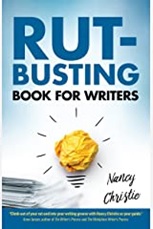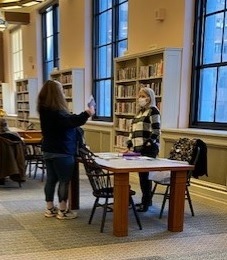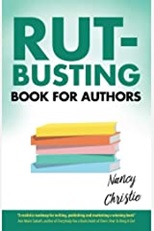Nancy Christie is the award-winning author of two short story collections: Traveling Left of Center and Other Stories and Peripheral Visions and Other Stories (both from Unsolicited Press); two books for writers: Rut-Busting Book for Authors and Rut-Busting Book for Writers (both from Mill City Press); and The Gifts Of Change (Atria/Beyond Words). Her newest short story collection, Mistletoe Magic and Other Holiday Tales, will be forthcoming from Unsolicited Press in 2023. Christie’s short stories and essays have appeared in numerous print and online publications.
The host of the Living the Writing Life podcast, the founder of the annual “Celebrate Short Fiction” Day, and a dynamic speaker who teaches writing workshops at conferences, libraries, and schools, Christie is a member of the American Society of Journalists and Authors (ASJA), the Women’s Fiction Writers Association (WFWA), and the Florida Writers Association (FWA). Most recently, she has presented motivational writing workshops at Cleveland Public Library including “Jump-Start Your Creativity” held on Saturday, December 4, 2021. Through her workshops, Christie is able to share valuable insights, drawn from her own personal experience with humor and authority. We asked her about being a writer and her writing process.
When did you know you wanted to live a writer’s life?
I have to admit that there was never that “ah hah!” moment when I decided to be a writer. As a child, I was always making up stories, so writing them down just came naturally to me. But I never actually thought of being a professional or published writer. I fell into that somewhat accidentally when I had an essay about my son’s soccer team published in our local paper and then, also accidentally, got a job as a freelance writer for our local business paper. From there, I went on to magazine writing—all while I was working full time—and then decided to go totally self-employed as a writer in 1996.
My first published short story was in 1994 and that’s when I first had the glimmer of a thought that maybe I could be more than just an article writer or freelance copywriter. But it wasn’t until my first fiction collection, Traveling Left of Center and Other Stories came out in 2014—a full decade after my first nonfiction book, The Gifts of Change, was published—that I finally looked around and said to myself, “Oh, I guess I am living the writing life!” Somehow, it took my short story collection to finally make me realize that.
Who were the writers that inspired you? Is there a particular novel or collection of short stories that made you think, “I want to write like that”?
Definitely Shirley Jackson. Her short stories and novels are just incredible. No matter how many times I read them, they still provoke the same reaction: a mixture of awe at her talent and shivers at the stories themselves. And Agatha Christie, specifically her autobiography, for her prosaic approach to writing as a way to earn money. That’s what gave me the courage to go freelance. And finally, Janet Sternburg’s The Writer on Her Work. Reading about other women writers (those I consider far above me!) and their challenges living the writing life made me feel part of a collective and helped me recognize that women especially face unique difficulties when trying to marry life and art.
What do you find to be the most difficult part of the writing process? What do you enjoy most?
I don’t know if it’s necessarily a part of the writing process, but it definitely affects that process, and it is the regrettable tendency to compare myself and my publication credits against other writers, and always coming out on the low end of the scale. And now, the older I get, to measure what I have accomplished thus far against the (theoretical) years I have left to achieve my writing goals. I find myself reading the obituaries of writers who were prolific into their eighties and beyond, and tell myself, “See, you still have time!” Of course, with each successive birthday, the time grows shorter…
What do I enjoy the most? That’s easy: making up stories. Or more accurately, letting the characters tell me their stories. Usually, the way it starts is some character I don’t know whispers a line or two of dialogue in my ear (generally at the most inopportune moment like when I’m doing 70 mph on the highway!) and from there, I just follow along, eavesdropping on what the characters are saying and watching their interactions, and always being surprised at what transpires. I don’t consider myself to be writing the stories or developing the plotlines so much as transcribing what happens, like I’m simply watching it all unfold.
Do you have a writing routine or ritual?
This has changed over the years. When my children were young, I’d get up early and try to get some of my own writing in before I worked on my writing assignments or client projects, and then wake them up. Then, for a long time when I lived alone, I was able to set aside several hours first thing in the morning and on weekends to work on my fiction—novels or short stories—or my nonfiction books.
When my parents were ill, I had to make adjustments again to be able to care for them and still write. And now that I am in a relationship, I’ve adjusted my routine once more to allow time to work on my own writing, plus do my client work, plus have time to spend with the person I love.
Bottom line? It’s always a balancing act to find time to write and earn a living and be present for those you care about. But one thing I know is that I have to make time for my fiction writing—even if that means doing it in bits and pieces—because that is such a big part of who I am that I won’t be that person anymore if I don’t do it.
You write fiction and nonfiction, you present creative writing workshops, you’re an editorial consultant, the host of your own podcast Living the Writing Life, and you maintain a very active website. You are in every way imaginable a professional writer. How do you keep it all together?
Hmmm… Ask me that on a day when I am convinced that I am keeping it all together! Actually, if I have limited time and have to prioritize, client work comes first because that’s how I pay my bills. If I have to finish a book project by a certain date, such as my Christmas collection, Mistletoe Magic and Other Holiday Tales that will be out in 2023, that’s what’s next. Then I do interviews for my podcast and other marketing activities, and somewhere, in between all that, work on my short stories or novels. I also have a big white board where I list my deadlines, so it stares me right in the face, along with reminders in my Outlook calendar and daily To-Do lists in my paper datebook. That way, I can never claim that I forgot! And, at the beginning of each year, I set one or two high priority goals, and make sure that each month I do some activity that supports those goals.
You’re the author of two award-winning books giving advice to writers; you write short stories and essays; and you also present workshops to help writers of all levels. If asked to choose between writing fiction and nonfiction, which would you choose?
Easy: fiction. While I love to tell people what to do and interview other experts on their take on what to do (which I did for both my writing books, Rut-Busting Book for Writers and Rut-Busting Book for Authors), I’d still rather play with my imaginary friends!
Can you tell us anything about your next book?
Mistletoe Magic and Other Holiday Tales is a holiday-themed collection of eight short stories. Most of them are humorous while some are a more on the sentimental side. Think of them as a Hallmark holiday movie in print form. One of the stories, “Lucinda and the Christmas List,” originally appeared in Peripheral Visions and Other Stories, and “Twelve Days Before Christmas” was originally published by Bethlehem Writers Roundtable. I am also working on novels for my Midlife Moxie series!
What advice about writing or publishing can you give to aspiring writers/authors?
Don’t be in a hurry to publish—a regrettable tendency that so many new writers have since it’s so easy to DIY your book. Get feedback, hire an editor, and revise as much as necessary to make the manuscript the best it can be. Then, take off your writing cap and put on your marketing hat and learn what you need to do to promote your books. There are so many resources out there (I list a number of them in Rut-Busting Book for Authors), that authors don’t have an excuse for not learning what they need to do to market their own books.
Connect with Nancy Christie via social media platforms by visiting her website at https://www.nancychristie.com/.
Books




